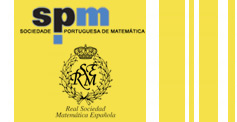
Carlos Herdeiro (Universidade do Porto)


Black
hole collisions in D dimensions and phenomenology for the LHC
String
theory suggests scenarios with large extra dimensions in which the fundamental
Planck scale could be as low as the TeV scale. It is expected that
particle collision with "trans-Planckian" centre of mass energies
will produce
black holes. This could therefore occur at the Large Hadron Collider (which will
reach energies of 14 TeV). Dedicated Monte Carlo event generators have been
designed to model the formation and evaporation of such black holes, and are
being used to filter experimental data at the LHC. These need as input some
observables, such as cross sections and energy lost into gravitational radiation,
which must be provided by theory.
In this
talk I shall decribe the mathematical framework and the first physical results of
a current research programme to obtain such observables. More concretely
I shall describe how we study black hole collisions in D dimensions, by solving
numerically the full non-linear Einstein equations.
References:
http://arXiv.org/abs/1001.2302
http://arXiv.org/abs/1006.3081



